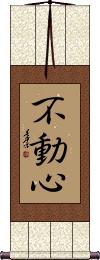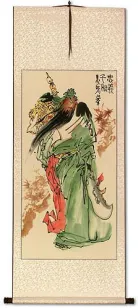Many custom options...
And formats...

Unwavering in Chinese / Japanese...
Buy an Unwavering calligraphy wall scroll here!
Personalize your custom “Unwavering” project by clicking the button next to your favorite “Unwavering” title below...
1. Unwavering
2. Unwavering Determination and Resolve
4. Unwavering Hall / Fudoshinkan
5. Fudoshin-Kai
Unwavering
Unwavering Determination and Resolve
This can be translated as unwavering determination, unwavering resolve, or strong determination.
堅定 means unwavering, firm, steady, staunch, and/or resolute.
決心 means determination, resolve, resolution, determined, firm and resolute, or to make up one's mind.
If you want a longer version, 堅定不移的決心 is also a popular phrase with a similar meaning. Contact me if you want that instead.
Unwavering Integrity
Unwavering Hall / Fudoshinkan
不動心館 can be translated as “Fudoshinkan,” or “Immovable Mind Hall.”
Fudoshinkan (不動心館) refers to various Japanese martial arts schools, primarily focusing on Aikido, Iaido (sword art), and Jodo (short staff), emphasizing the concept of Fudoshin (不動心) – a calm, immovable mind in the face of challenge, reflecting traditional samurai spirit through dynamic training and inner peace
Immovable mind; unwavering composure. Hall/school (as in -kan / -gwan).
Fudoshin-Kai
不動心会 can be translated as “Fudoshin-Kai,” “Immovable Mind Association,” or “Unwavering Society,” depending on usage.
Immovable Mind
fudoshin
不動心 is one of the five spirits of the warrior (budo) and is often used as a Japanese martial arts tenet.
Under that context, places such as the Budo Dojo define it this way: An unshakable mind and an immovable spirit is the state of fudoshin. It is courage and stability displayed both mentally and physically. Rather than indicating rigidity and inflexibility, fudoshin describes a condition that is not easily upset by internal thoughts or external forces. It is capable of receiving a strong attack while retaining composure and balance. It receives and yields lightly, grounds to the earth, and reflects aggression back to the source.
Other translations of this title include unwavering mind, immovable mind, unwavering composure, imperturbability, steadfastness, keeping a cool head in an emergency, or keeping one's calm (during a fight).
The first two Kanji alone mean immobility, firmness, fixed, steadfastness, motionless, and idle.
The last Kanji means heart, mind, soul, or essence.
Together, these three Kanji create a title defined as “immovable mind” within the context of Japanese martial arts. However, in Chinese, it would mean “motionless heart,” and in Korean Hanja, “wafting heart” or “floating heart.”
This in-stock artwork might be what you are looking for, and ships right away...
Gallery Price: $200.00
Your Price: $88.88
Gallery Price: $200.00
Your Price: $98.88
Not the results for unwavering that you were looking for?
Below are some entries from our dictionary that may match your unwavering search...
| Characters If shown, 2nd row is Simp. Chinese |
Pronunciation Romanization |
Simple Dictionary Definition |
堅貞不渝 坚贞不渝 see styles |
jiān zhēn bù yú jian1 zhen1 bu4 yu2 chien chen pu yü |
More info & calligraphy: Unwavering Integrity |
腹が据わる see styles |
haragasuwaru はらがすわる |
More info & calligraphy: Unwavering |
不動 不动 see styles |
bù dòng bu4 dong4 pu tung fudou / fudo ふどう |
motionless (adj-no,n) (1) immovable; motionless; firm; unwavering; unshakable; steadfast; (2) (abbreviation) {Buddh} (See 不動明王) Acala (Wisdom King); Fudō; fierce Buddhist deity; (place-name, surname) Fudou acala; niścala; dhruva. The unmoved, immobile, or motionless; also 無動 the term is used for the unvarying or unchanging, for the pole-star, for fearlessness, for indifference to passion or temptation. It is a special term of Shingon 異言 applied to its most important Bodhisattva, the 不動明王 q. v. |
果決 果决 see styles |
guǒ jué guo3 jue2 kuo chüeh |
firm; unwavering |
死死 see styles |
sǐ sǐ si3 si3 ssu ssu |
rigid; unwavering; unbendable; firm (hold on something); tenacious |
直行 see styles |
zhí xíng zhi2 xing2 chih hsing naoyuki なおゆき |
to go straight; straight forward; fig. to do right (n,vs,vi) (1) going straight (to); going direct; going without stopping; (n,vs,vi) (2) unwavering action; decisive action; (noun - becomes adjective with の) (3) upright conduct; (given name) Naoyuki |
一向宗 see styles |
yī xiàng zōng yi1 xiang4 zong1 i hsiang tsung ikkoushuu / ikkoshu いっこうしゅう |
(See 浄土真宗) Ikkō sect (of Buddhism); Jōdo Shinshū; True Pure Land School The 眞宗 Shin or Pure-land Shin Sect founded by Shinran, in Japan, whose chief tenet is unwavering reflection on Amida (by repeating his name). |
一辺倒 see styles |
ippentou / ippento いっぺんとう |
(n-suf,n) complete devotion (to); total commitment (to); unvarying support (for); unwavering fixation (on); rigid preoccupation (with) |
有毅力 see styles |
yǒu yì lì you3 yi4 li4 yu i li |
persevering; unwavering |
無散亂 无散乱 see styles |
wú sàn luàn wu2 san4 luan4 wu san luan mu sanran |
unwavering |
体々の先 see styles |
taitainosen たいたいのせん |
(exp,n) (obscure) {MA} answering one's opponent's attack with an unwavering strike |
朱雲折檻 朱云折槛 see styles |
zhū yún zhé jiàn zhu1 yun2 zhe2 jian4 chu yün che chien |
(idiom) Zhu Yun breaks the railing (Zhu Yun was a Han Dynasty official who accused the emperor's tutor of corruption, and when sentenced to death, clung to the palace hall railing so fiercely while demanding justice that he broke it); (fig.) to speak the truth with unwavering courage; to admonish fearlessly; also pr. [zhu1yun2-she2jian4] |
無有怯劣 无有怯劣 see styles |
wú yǒu qiè liè wu2 you3 qie4 lie4 wu yu ch`ieh lieh wu yu chieh lieh muu kōretsu |
unwavering |
確固不動 see styles |
kakkofudou / kakkofudo かっこふどう |
(yoji) unshakeable (e.g. belief); invincible; steadfastness; firmness; unwavering (e.g. support); absolutely secure |
しゃっきり see styles |
shakkiri しゃっきり |
(adv,adv-to,vs) (onomatopoeic or mimetic word) (See しゃきっと) crisp; straight (back); unwavering attitude; brisk |
揺るぎない see styles |
yuruginai ゆるぎない |
(adjective) solid; firm; steady; unshakeable; unwavering |
揺るぎ無い see styles |
yuruginai ゆるぎない |
(adjective) solid; firm; steady; unshakeable; unwavering |
腹がすわる see styles |
haragasuwaru はらがすわる |
(exp,v5r) to have guts; to be unwavering in one's resolution |
熾然無動妙善 炽然无动妙善 see styles |
chì rán wú dòng miào shàn chi4 ran2 wu2 dong4 miao4 shan4 ch`ih jan wu tung miao shan chih jan wu tung miao shan shinen mudō myōzen |
ardent, unwavering, excellent |
腹の据わった see styles |
haranosuwatta はらのすわった |
(exp,adj-f) gutsy; fearless; unwavering |
Variations: |
taitainosen たいたいのせん |
(exp,n) (rare) {MA} answering one's opponent's attack with an unwavering strike |
Variations: |
kakkofudou / kakkofudo かっこふどう |
(adj-no,n) (yoji) unshakeable (e.g. belief); invincible; steadfastness; firmness; unwavering (e.g. support); absolutely secure |
Variations: |
yuruginai ゆるぎない |
(adjective) solid; firm; steady; unshakeable; unwavering |
Variations: |
haragasuwaru はらがすわる |
(exp,v5r) to have guts; to be unwavering in one's resolution |
Variations: |
haragasuwaru はらがすわる |
(exp,v5r) to have guts; to be unwavering in one's resolution |
Variations: |
yuruginai ゆるぎない |
(adjective) firm; solid; steady; secure; unshakeable; unwavering |
The following table may be helpful for those studying Chinese or Japanese...
| Title | Characters | Romaji (Romanized Japanese) | Various forms of Romanized Chinese | |
| Unwavering | 腹が据わる | haragasuwaru | ||
| Unwavering Determination and Resolve | 堅定決心 坚定决心 | jiān dìng jué xīn jian1 ding4 jue2 xin1 jian ding jue xin jiandingjuexin | chien ting chüeh hsin chientingchüehhsin |
|
| Unwavering Integrity | 堅貞不渝 坚贞不渝 | jiān zhēn bù yú jian1 zhen1 bu4 yu2 jian zhen bu yu jianzhenbuyu | chien chen pu yü chienchenpuyü |
|
| Unwavering Hall Fudoshinkan | 不動心館 | fudōshin-kan | bù dòng xīn guǎn bu4 dong4 xin1 guan3 bu dong xin guan budongxinguan | pu tung hsin kuan putunghsinkuan |
| Fudoshin-Kai | 不動心會 不動心会 | fu dō shin kai fudōshinkai | bù dòng xīn huì bu4 dong4 xin1 hui4 bu dong xin hui budongxinhui | pu tung hsin hui putunghsinhui |
| Immovable Mind | 不動心 | fu dou shin fudoushin fu do shin | ||
| In some entries above you will see that characters have different versions above and below a line. In these cases, the characters above the line are Traditional Chinese, while the ones below are Simplified Chinese. | ||||
Successful Chinese Character and Japanese Kanji calligraphy searches within the last few hours...











